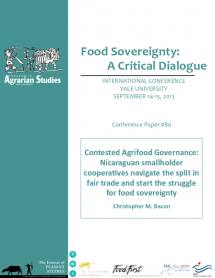Ideas into movement
Boost TNI's work
50 years. Hundreds of social struggles. Countless ideas turned into movement.
Support us as we celebrate our 50th anniversary in 2024.

The big tent version of fair trade collapsed when Fair Trade USA split from Fairtrade International, a global stakeholder governed network of certification agencies, firms, and representative farmer organizations. Despite protest from fair trade pioneers, smallholder cooperatives , and civil society, Fair Trad e USA developed weaker standards , granting certification to undeserving coffee plantations and unorganized smallholders.

Fair traders became increasingly disillusioned with the organization’s shifting standards and non - participatory governance structures. Hybrid approaches link ing smallholder cooperatives to “socially responsible” coffee roasting companies have provided family farmers with expanding markets, increased access to credit , and supported grassroots sustainable development projects.
Nicaragua’s smallholder cooperatives have simultaneously engaged global fair trade governance debates and shifted focus from coffee exports to local corn markets and food security. Many factors influence rural food security, including harvests, prices, incomes, crop diversity , and access to common pool resources such as water, forests, and pastures.
I used a community - based participatory action research app roach to develop a case study with coffee farmers and cooperative staff in northern Nicaragua. The results link residents’ perceptions of food insecurity to their changing livelihoods, political economic context, and local institutions. From the 1960s to the present , many residents transitioned from farmworkers to cooperative owners.
In the mid - 1990s, they linked to a secondary cooperative and fair trade coffee markets. Despite these gains, by 2010 most househol ds still suffered an average of 3 months of seasonal food scarcity. One response links the cooperative ’s organizational capacity with concepts from agroecology and food system to increase farmers’ access to food, locally adapted seeds, and other common poo l resources.
Strategies include cooperat ive - based grain and seed banks, farmer experimentation, and community water projects. This case and Nicaragua’s evolving government policy highlight new opportunities for linking fair trade and food sovereignty.
Christopher M. Bacon, Assistant Professor, Department of Environmental Studies and Sciences, Santa Clara University Professor Bacon’s primary research examines the political ecology of conventional and alternative food systems and their impacts on rural development in northern Nicaragua. He often uses a community-based participatory action research approach. In addition to continued work in Central America, he recently initiated research focused on environmental and food justice in San Jose, California. He has published in the Journal of Peasant Studies, Ecology and Society, and World Development.
Food Sovereignty: a critical dialogue, 14 - 15 September, New Haven.